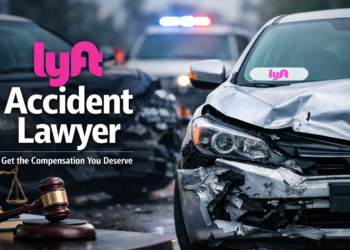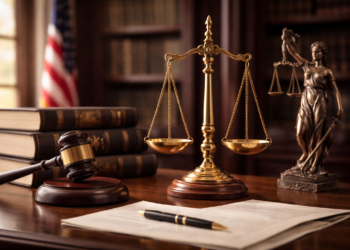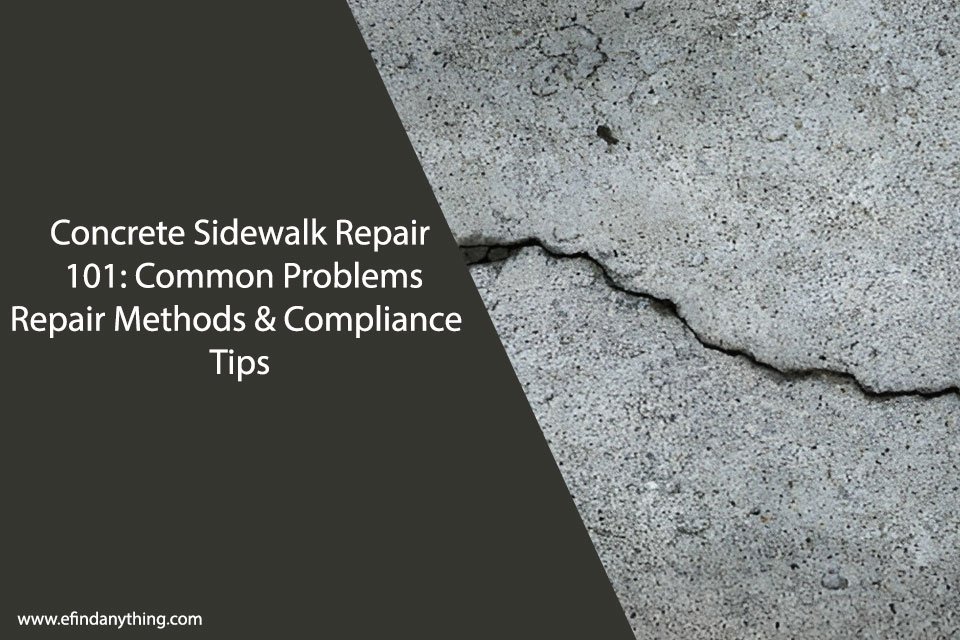
Being involved in an auto collision can be a traumatic experience, leaving you with physical injuries, emotional distress, and financial burdens. In the aftermath of a vehicle crash, it’s essential to seek legal guidance to ensure you receive the compensation you deserve.
Navigating the complex legal process can be overwhelming, but with the right guidance, you can protect your rights and interests. This article will provide you with valuable insights into the legal aspects of a car accident, helping you make informed decisions about your case.
Key Takeaways
- Understanding your rights after a vehicle crash
- The importance of seeking legal guidance
- How to navigate the complex legal process
- Factors to consider when choosing a lawyer
- Steps to take immediately after an auto collision
The Critical First Steps Following a Car Accident
Following a car accident, it’s vital to remain calm and take immediate action to secure your safety and that of others involved. The steps you take in the moments following a traffic accident can significantly impact your well-being and the success of your car insurance claim.
Ensuring Safety and Seeking Medical Attention
Your safety is paramount. If the accident occurs on a busy road, move to a safe location to avoid further hazards. Check yourself and others for injuries. If anyone is injured, it’s crucial to call emergency services immediately.
When to Call Emergency Services
Call 911 or your local emergency number if you or anyone else is injured, or if the accident is blocking traffic. Even if injuries seem minor, medical attention is necessary as some injuries may not be immediately apparent.
Documenting Injuries and Treatment
Keep a detailed record of your injuries and any medical treatment you receive. This documentation will be vital for your car insurance claim. Include dates of hospital visits, treatments, and any medications prescribed.
Properly Documenting the Accident Scene
Documenting the accident scene is crucial for establishing the facts of the incident. Take photos and videos of the scene, including damage to vehicles and any visible injuries.
Taking Photos and Videos
Use your smartphone to capture comprehensive images of the accident scene, including vehicle positions, damage, and any relevant road signs or signals.
Gathering Witness Information
If there are witnesses, gather their contact information. Witness statements can be invaluable in supporting your account of the accident.
| Action | Description | Importance |
|---|---|---|
| Ensure Safety | Move to a safe location, check for injuries | High |
| Document Scene | Take photos, videos, gather witness info | High |
| Report Accident | Call authorities, notify insurance company | High |
Reporting the Accident to Authorities
It’s essential to report the accident to the police and your insurance company. A police report provides an official record of the accident, which is crucial for insurance claims.
Police Reports and Their Importance
A police report documents the accident, including details of those involved and any citations issued. This report is a critical piece of evidence for your car insurance claim.
Notifying Your Insurance Company
Notify your insurance company as soon as possible after the accident. Provide them with the details of the accident, including the police report number.
Understanding Your Legal Rights After a Car Accident
After a car accident, understanding your legal rights is crucial for navigating the complex process of seeking compensation. This knowledge empowers you to make informed decisions when dealing with insurance companies and potentially consulting a car injury attorney.
State-Specific Car Accident Laws in the US
Car accident laws vary significantly from state to state, making it essential to understand the specific laws in your jurisdiction. Two critical aspects of these laws are comparative vs. contributory negligence and minimum insurance requirements.
Comparative vs. Contributory Negligence
In the US, states follow either comparative or contributory negligence laws. Comparative negligence allows you to recover damages even if you are partially at fault, while contributory negligence bars recovery if you are found to be even slightly at fault.
Minimum Insurance Requirements
Each state has its minimum insurance requirements that drivers must meet to legally operate a vehicle. Understanding these requirements is vital for determining the potential sources of compensation after an accident.
Statute of Limitations for Filing Claims
The statute of limitations sets a strict deadline for filing a car accident claim. This time limit varies by state, and missing it can result in losing your right to seek compensation.
Exceptions to Standard Time Limits
While the statute of limitations is generally strict, there are exceptions. For instance, if the injured party is a minor or if the accident involves a government entity, the time limits may be different.
Fault vs. No-Fault Insurance States
The US has both fault and no-fault insurance states. In fault states, the at-fault driver’s insurance is responsible for damages, while in no-fault states, your own insurance covers your damages regardless of fault.
How Fault Determination Affects Your Claim
Fault determination significantly impacts your ability to file a successful claim. In fault states, proving the other party’s liability is crucial, while in no-fault states, the focus is on your damages and dealing with your insurance company.
When Should You Seek Professional Legal Guidance?
Determining the right time to seek professional legal help after a car crash is vital for your financial recovery. After a vehicle collision, the complexity of dealing with insurance companies, medical bills, and potential legal issues can be overwhelming. While minor accidents might not require a lawyer, severe accidents involving major injuries or disputes over fault absolutely do. In such circumstances, consulting with skilled Orlando accident attorneys, or from elsewhere, can be an important step toward protecting your rights and ensuring you can receive the compensation you are entitled to for medical expenses and other damages.
Signs Your Case Requires Legal Representation
If you’ve suffered severe injuries or fatalities, it’s crucial to seek legal guidance. In such cases, an attorney can help you navigate the legal process and ensure you receive fair compensation.
Severe Injuries or Fatalities
Severe injuries or fatalities in a car accident often lead to complex legal battles. An experienced attorney can help you handle these situations effectively.
Disputed Liability Situations
In cases where liability is disputed, a legal professional can help gather evidence and build a strong case to support your claim.
Benefits of Early Attorney Consultation
Consulting an attorney early in the process can significantly benefit your case. They can help preserve critical evidence and guide you through the legal system.
Preserving Critical Evidence
An attorney can ensure that vital evidence is collected and preserved, strengthening your case.
Avoiding Costly Mistakes
Early consultation can also help you avoid costly mistakes that might jeopardize your claim.
What to Expect During Your Initial Legal Consultation
During your first meeting with an attorney, they will ask questions about your case and provide guidance on the next steps.
Questions Your Attorney Will Ask
Be prepared to answer questions about the accident, including the circumstances surrounding it and any injuries sustained.
Information You Should Bring
Bringing relevant documents, such as medical records and police reports, can help your attorney understand your case better.
The Impact of Car Accident Injuries on Your Life and Claim
The aftermath of a road accident often involves a complex mix of physical injuries, emotional trauma, and legal challenges that can significantly influence the outcome of a car injury claim. Understanding the full impact of these injuries is crucial for navigating the car insurance process effectively.
Common Physical Injuries and Their Long-Term Effects
Car accidents can result in a variety of physical injuries, ranging from minor cuts and bruises to severe conditions like fractures and spinal cord injuries. Two common types of injuries are whiplash and traumatic brain injuries.
Whiplash and Soft Tissue Injuries
Whiplash occurs when the head is suddenly jerked back and forth, straining the neck muscles and potentially causing long-term discomfort. Soft tissue injuries can also lead to chronic pain and limited mobility.
Traumatic Brain Injuries
Traumatic brain injuries (TBI) can have profound and lasting effects on an individual’s cognitive and emotional well-being. TBI can result in memory loss, mood swings, and difficulties with concentration.
Psychological Trauma Following an Accident
In addition to physical injuries, car accidents can also cause significant psychological trauma. Conditions such as PTSD and anxiety disorders are common among accident survivors.
PTSD and Anxiety Disorders
Post-traumatic stress disorder (PTSD) can manifest as flashbacks, nightmares, and avoidance behaviors. Anxiety disorders can lead to persistent fear and apprehension.
Emotional Distress Claims
Emotional distress claims are an essential part of many car injury claims, as they acknowledge the psychological impact of the accident. Documenting emotional distress is crucial for securing fair compensation.
How Injuries Affect Compensation Calculations
The severity and long-term impact of injuries play a significant role in determining the compensation amount in car injury claims. Medical expert testimony and life care planning are critical components of this process.
Medical Expert Testimony
Medical experts provide objective assessments of the injuries, helping to establish a clear link between the accident and the resulting conditions.
Life Care Planning
Life care planning involves creating a comprehensive plan for the ongoing care needs of the injured individual, including medical treatment, therapy, and other support services.
| Injury Type | Short-Term Effects | Long-Term Effects |
|---|---|---|
| Whiplash | Neck pain, stiffness | Chronic pain, limited mobility |
| Traumatic Brain Injury | Confusion, headache | Cognitive impairment, emotional changes |
| Soft Tissue Injuries | Pain, swelling | Chronic pain, scarring |
Types of Compensation Available After a Car Accident
After a car accident, understanding the compensation you’re entitled to can be crucial for your recovery. The types of compensation available can significantly impact your financial stability and overall well-being.
Economic Damages You Can Recover
Economic damages are tangible costs associated with the accident, including medical expenses, lost wages, and property damage. These damages are typically easier to quantify.
Medical Expenses and Future Treatment Costs
Compensation for medical expenses covers the costs of immediate and ongoing medical care, including hospital stays, surgeries, and rehabilitation. Future treatment costs are also considered, ensuring you’re covered for any long-term medical needs resulting from the accident.
Lost Wages and Diminished Earning Capacity
If your injuries prevent you from working, you can claim compensation for lost wages. Additionally, if your earning capacity is diminished due to the accident, you may be entitled to further compensation to reflect this loss.
Property Damage and Vehicle Replacement
Compensation for property damage includes the cost of repairing or replacing your vehicle, as well as any other damaged property. Ensuring you’re not left with financial burdens due to someone else’s negligence is a key aspect of economic damages.
Non-Economic Damages and Their Value
Non-economic damages compensate for intangible losses, such as pain and suffering, and loss of enjoyment of life. These damages are more subjective and can vary significantly from case to case.
Pain and Suffering Calculations
Pain and suffering calculations consider the physical and emotional distress caused by the accident. While challenging to quantify, these damages are a crucial part of your overall compensation.
Loss of Enjoyment of Life
If the accident has impacted your ability to enjoy daily activities or hobbies, you may be entitled to compensation for this loss. This aspect of non-economic damages acknowledges the broader impact of the accident on your quality of life.
Punitive Damages in Egregious Cases
In cases where the other party’s actions were particularly reckless or negligent, punitive damages may be awarded. These damages are intended to punish the responsible party and deter similar behavior in the future.
When Courts Award Additional Compensation
Punitive damages are typically awarded in addition to economic and non-economic damages. The decision to award punitive damages depends on the severity of the other party’s actions and is made at the court’s discretion.
Consulting with an accident lawyer can help you understand the types of compensation you’re eligible for following a vehicle accident or car collision. They can guide you through the process, ensuring you receive the compensation you deserve.
Navigating the Insurance Claims Process
The aftermath of an auto collision often involves dealing with insurance companies, a process that requires careful navigation to achieve a fair settlement. When you’re involved in a car accident, it’s essential to understand the steps involved in filing a claim and the tactics insurance companies might use.
Dealing Effectively with Insurance Adjusters
Insurance adjusters play a crucial role in the claims process. Their goal is to assess the damage and determine the extent of the insurance company’s liability.
What to Say and What to Avoid
When communicating with insurance adjusters, it’s vital to be cautious about what you say. Avoid making recorded statements without consulting an attorney, as these can be used against you.
Recorded Statement Considerations
Before giving a recorded statement, consider the potential consequences. It’s often advisable to consult with an attorney first to understand your rights and the implications of your statement.
Common Insurance Company Tactics to Watch For
Insurance companies often employ various tactics to minimize their payouts. Being aware of these tactics can help you navigate the process more effectively.
Quick Settlement Offers
One common tactic is to offer a quick settlement. While this might seem appealing, it’s often less than what you might be entitled to. It’s crucial to evaluate the offer carefully and consider seeking legal advice.
Claim Devaluation Strategies
Insurance companies might also use strategies to devalue your claim. Understanding these strategies can help you counter them effectively.
How an Attorney Strengthens Your Position
Having an attorney can significantly strengthen your position when dealing with insurance companies.
Negotiation Expertise
An experienced attorney brings negotiation expertise to the table, helping to ensure that you receive a fair settlement.
Claim Valuation Knowledge
Attorneys also have the knowledge to accurately value your claim, taking into account all relevant factors, including medical expenses, lost wages, and pain and suffering.
- Understand your rights and the insurance claims process.
- Be cautious when dealing with insurance adjusters.
- Consider consulting an attorney to strengthen your position.
Overcoming Common Challenges in Car Accident Cases
The complexities involved in car accident cases can be daunting, ranging from disputed liability to dealing with uninsured motorists. Victims often face significant hurdles in their pursuit of fair compensation.
Disputed Liability Scenarios
Disputes over who is at fault in a vehicle crash are common and can significantly delay the car insurance claim process.
Multi-Vehicle Accidents
In multi-vehicle accidents, determining liability can become particularly complicated due to the number of parties involved.
Lack of Witnesses or Evidence
A lack of witnesses or concrete evidence can further complicate the process of establishing fault in a traffic accident.
Pre-existing Condition Complications
Pre-existing medical conditions can complicate car accident claims, as insurance companies may argue that the condition, rather than the accident, is responsible for the victim’s injuries.
The Eggshell Plaintiff Rule
The “eggshell plaintiff” rule is a legal doctrine that protects victims with pre-existing conditions, holding defendants liable for the full extent of injuries they cause.
Medical Documentation Strategies
Effective medical documentation is crucial in such cases, as it helps to establish a clear link between the accident and the victim’s injuries.
Dealing with Uninsured/Underinsured Motorists
When the at-fault party lacks adequate insurance coverage, victims may face significant challenges in securing fair compensation.
UM/UIM Coverage Options
Uninsured/Underinsured Motorist (UM/UIM) coverage can provide a vital safety net for victims in these situations.
Alternative Recovery Methods
In some cases, alternative recovery methods, such as pursuing a claim against other liable parties, may be necessary.
How to Choose the Right Car Accident Attorney
After a car accident, finding the right car injury attorney can make a significant difference in your case’s outcome. The right attorney will not only understand the complexities of car accident law but also be committed to securing the car accident compensation you deserve.
Essential Qualifications to Look For
When searching for a car accident attorney, certain qualifications can make a significant difference in the handling of your case.
Experience with Similar Cases
Look for an attorney with a proven track record in handling cases similar to yours. Their experience can be invaluable in navigating the legal process.
Trial Experience vs. Settlement History
Understanding whether your attorney has trial experience or a history of settling cases out of court can help you gauge their strategy for your case.
Critical Questions to Ask During Consultation
- Case Management Approach: How will they manage your case?
- Communication Expectations: How often will they update you on your case’s progress?
Understanding Attorney Fee Structures
Contingency Fee Arrangements
Many car accident attorneys work on a contingency fee basis, meaning they only get paid if you receive compensation.
Additional Case Expenses
It’s essential to understand any additional expenses you might be responsible for beyond the attorney’s contingency fee.
The Legal Process Timeline for Car Accident Claims
The legal journey following a car accident involves several key stages that are essential to understand. After being involved in an auto accident, it’s crucial to know what to expect during the legal process to navigate it effectively.
Investigation and Evidence Gathering Phase
The first stage involves a thorough investigation of the car crash. This includes gathering all relevant evidence to build a strong case.
Accident Reconstruction Experts
Accident reconstruction experts play a vital role in determining the cause and sequence of events leading to the accident.
Medical Expert Consultations
Medical experts provide critical insights into the injuries sustained, helping to establish the extent of damages.
Demand Letters and Settlement Negotiations
After gathering evidence, the next step is to send a demand letter to the insurance company, initiating road accident settlement negotiations.
Initial Offers and Counteroffers
The insurance company may make an initial offer, which can be negotiated through counteroffers until a fair settlement is reached.
Mediation Possibilities
In some cases, mediation may be used to facilitate negotiations and reach a settlement without going to court.
Litigation Process When Settlement Fails
If settlement negotiations fail, the case proceeds to litigation.
Discovery and Deposition Procedures
During litigation, both parties engage in discovery and depositions to gather more information.
Trial Preparation and Court Proceedings
The case is then prepared for trial, where it will be presented to a judge or jury.
| Stage | Description | Key Elements |
|---|---|---|
| Investigation | Gathering evidence | Accident reconstruction, medical expert consultations |
| Settlement Negotiations | Negotiating with insurance companies | Demand letters, initial offers, counteroffers, mediation |
| Litigation | Proceeding to court | Discovery, depositions, trial preparation |
Conclusion: Rebuilding Your Life After a Car Accident
After experiencing a vehicle collision, the road to recovery can be long and challenging. The physical and emotional trauma caused by a car injury can be overwhelming, making it essential to seek professional guidance from an accident lawyer.
Rebuilding your life after a car accident requires a comprehensive approach. It involves not only recovering from your injuries but also dealing with the financial and emotional aftermath. An accident lawyer can help you navigate the complex process of filing a claim and ensure that you receive the compensation you deserve.
As you move forward, it’s crucial to prioritize your physical and mental well-being. Seeking medical attention and counseling can help alleviate the trauma associated with a car accident. Additionally, working with an experienced accident lawyer can provide you with the support and guidance needed to rebuild your life.
By understanding your legal rights and the options available to you, you can make informed decisions about your case. With the right support, you can overcome the challenges posed by a vehicle collision and move towards a more stable and secure future.
FAQ
What should I do immediately after a car accident?
After a car accident, ensure your safety and the safety of others, seek medical attention if necessary, document the accident scene, and report the incident to the authorities and your insurance company.
How do I document the accident scene effectively?
To document the accident scene, take photos and videos of the damage, gather witness information, and note the location, time, and weather conditions. This evidence can be crucial for your car insurance claim or road accident settlement.
What are my legal rights after a car accident?
After a car accident, you have the right to seek compensation for your injuries and damages. State-specific car accident laws, such as comparative or contributory negligence, may affect your claim. Consult with a car injury attorney to understand your rights.
When should I seek professional legal guidance after a car accident?
You should consider seeking legal representation if you’ve suffered severe injuries, if liability is disputed, or if you’re unsure about the claims process. A car accident lawyer can help you navigate the complex process and ensure you receive fair compensation.
What types of compensation are available after a car accident?
You may be eligible for economic damages, such as medical expenses and lost wages, as well as non-economic damages, like pain and suffering. In some cases, punitive damages may also be awarded. A car accident compensation expert can help you understand the types of damages you can recover.
How do I navigate the insurance claims process effectively?
To navigate the insurance claims process, be cautious when dealing with insurance adjusters, avoid making recorded statements without consulting an attorney, and be aware of common insurance company tactics. A car insurance claim expert can help you strengthen your position.
What are the common challenges in car accident cases, and how can I overcome them?
Common challenges include disputed liability, pre-existing conditions, and dealing with uninsured or underinsured motorists. To overcome these challenges, gather evidence, consult with medical experts, and consider alternative recovery methods, such as UM/UIM coverage.
How do I choose the right car accident attorney for my case?
When choosing a car accident attorney, look for essential qualifications, such as experience with similar cases and trial experience. Ask critical questions during consultation, and understand their fee structures, including contingency fee arrangements.
What is the typical timeline for the legal process in car accident claims?
The legal process timeline includes investigation and evidence gathering, demand letters and settlement negotiations, and potentially, litigation. Understanding the timeline can help you prepare for the process and manage your expectations.
How can a car accident attorney help me with my vehicle collision claim?
A car accident attorney can help you navigate the complex claims process, negotiate with insurance companies, and ensure you receive fair compensation for your injuries and damages. They can also provide guidance on the road accident settlement process.











